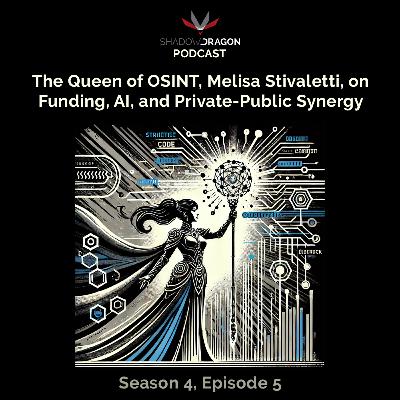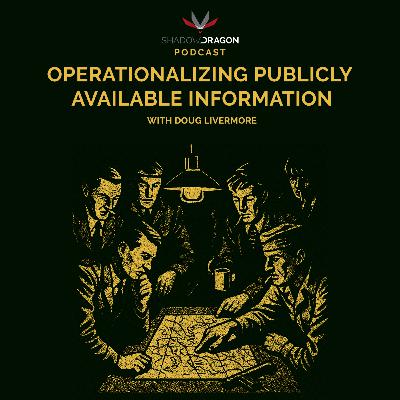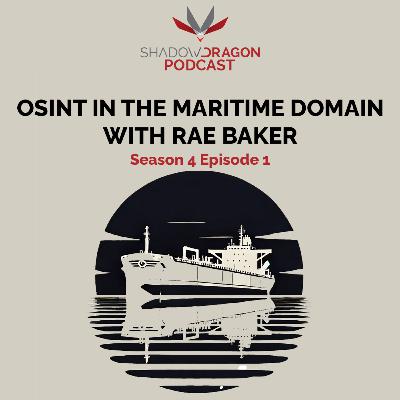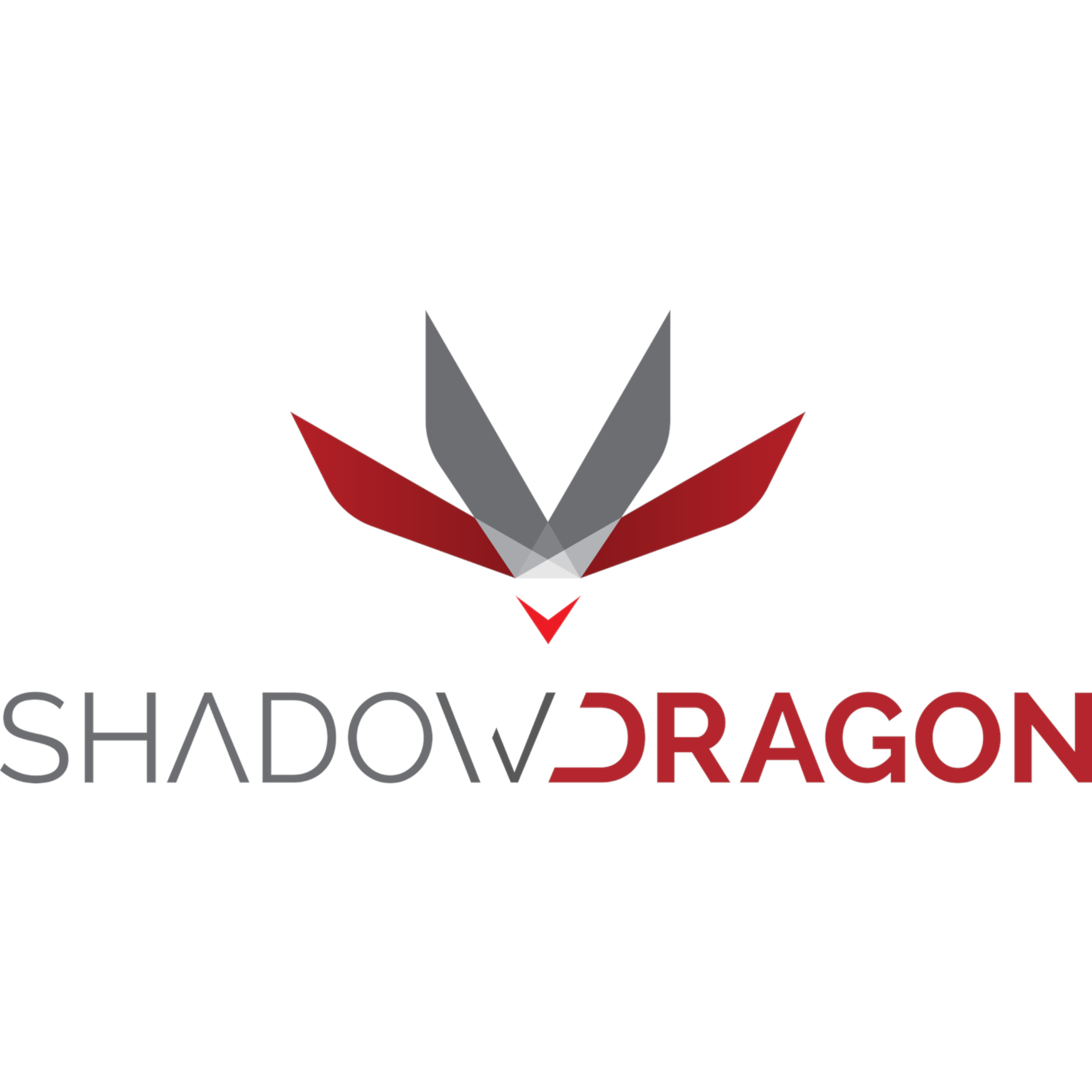Discover OSINT with ShadowDragon & Digital Tools For Modern Investigations
OSINT with ShadowDragon & Digital Tools For Modern Investigations

OSINT with ShadowDragon & Digital Tools For Modern Investigations
Author: Daniel Clemens from ShadowDragon, LLC
Subscribed: 76Played: 431Subscribe
Share
© 2025 ShadowDragon, LLC
Description
This podcast covers a variety of cyber security topics, with a focus on candor, and zero b.s. Topics may include OSINT, PAI, Tailored Monitoring, Investigations, Offensive Disciplines, AI/ML, Object Recognition, Forensics, Historical Industry Lore, All things considered in Cyber.
32 Episodes
Reverse
Guest introduction & background
Melisa describes how the 2010–11 Arab Spring revealed the power of social-media data while she was a Department of the Army civilian in Afghanistan.
Since then she has worked across academia, federal agencies, and the private sector to professionalize open-source intelligence, currently serving as OSINT Director at Guidehouse and chair of AFCEA’s Emerging Professionals in the Intelligence Community (EPIC) committee.
Why OSINT matters now
Every modern investigation—military, law-enforcement, or corporate—relies on publicly available information (PAI); skipping it “short-changes” the mission.
Recent unclassified U.S. DoD, ODNI, and Army OSINT strategies publicly signal a whole-of-government commitment and an invitation for industry partnership.
Congress has underscored this shift with the first House Subcommittee dedicated to open-source intelligence.
Public-private synergy & funding gaps
Dual-use commercial tools and venture-backed research and development give the U.S. an edge, but the Intelligence Community still allocates less than 1% of its budget to OSINT despite the discipline providing roughly 30% of material in the President’s Daily Brief.
Cloud storage, advanced data sets, and continuous tool development make OSINT “cheap relative to satellites” but far from free; chronic underfunding risks hollowing out capabilities.
Generative AI opportunities & cautions
Large language models accelerate sense-making (summarization, triage, translation) amid an ever-expanding data ocean.
Analysts must demand rigorous sourcing and bias evaluation—“every AI-generated sentence needs a footnote”—and should favor secure, controlled models over public chatbots.
The real value lies in “a collector who knows how to use AI,” not in AI replacing human tradecraft.
Operational vs. strategic OSINT
Tactical users (SOF, JSOC) need rapid, geotagged, mission-ready insights; strategic analysts focus on long-term trends, indications & warnings, and partner sharing.
Both require advanced skills—data science, cyber forensics, provenance verification—not just “having an internet connection.”
Professionalization & future skills
Formal tradecraft standards, dedicated career paths, and prompt-engineering expertise are emerging to match HUMINT, SIGINT, and GEOINT.
Melisa urges the next generation of intel professionals to embrace OSINT’s complexity, continuous learning curve, and growing strategic impact.
Persistent misconceptions debunked
Myth #1: OSINT is “free.” Reality: tooling, storage, and talent are expensive and scaling.
Myth #2: OSINT is inferior to classified sources. Reality: it often provides the first, fastest, and sometimes only vantage point—and stands on equal analytic rigor.
Special Guest: Melisa Stivaletti .
Former Green Beret and national-security advocate Doug Livermore joins the ShadowDragon team to unpack how publicly available information (PAI) and commercial open-source intelligence (OSINT) are transforming modern conflict—and why agile private-sector partners now shape outcomes as much as governments do.
Key points & take-aways
Breaking the “intel vs. ops” firewall
* U.S. commanders once distrusted anything that didn’t come from classified HUMINT or SIGINT; today, PAI often drives the find-fix-finish cycle faster than traditional sources.
Field lessons from five theaters
* Iraq, Afghanistan, Mali, the DRC, and the Central African Republic showed that PAI is frequently the only data commanders can legally share with immature or non-NATO partner forces.
* Cheap commercial tools—Google Maps, social media scraping, Internet-of-Things exhaust—now reveal patterns of life, financial flows, and physical locations in minutes.
Cultural turning points
* The Arab Spring (2010) and ISIS propaganda boom (2014-15) proved that open networks can topple regimes and expose targets.
* Russia’s 2022 invasion of Ukraine and the Israel-Hamas war brought OSINT to prime time, with private analysts mapping tank battalions and documenting war crimes in real time.
Afghanistan 2021: Private networks move faster than states
* Livermore’s nonprofits No One Left Behind and SOAA used PAI, commercial satellites, and encrypted chat to steer evacuees past Taliban checkpoints when official channels bogged down.
* U.S. intelligence officers quietly pulled data from these civilian ops centers—a preview of future public-private crisis response.
Information warfare & influence ops
* Open digital terrain lets both democracies and adversaries micro-target audiences, erode civil trust, or rally global support; mastering sentiment analysis is now a core skill for operators.
Policy & the road ahead
* Expect formalized private-public frameworks that let nonprofits and tech firms plug straight into combatant-command fusion cells.
* Civil-liberties safeguards must keep pace, distinguishing U.S. person data from foreign-adversary exploitation.
Special Guest: Doug Livermore.
In this episode of the Shadow Dragon podcast, Director of National Security David Cook (https://www.linkedin.com/in/david-n-cook/) hosts a conversation for National Human Trafficking Prevention Month. The panel features:
- Matt Richardson (https://www.linkedin.com/in/mattwrichardson/), Senior Advisor of Intelligence and Child Safety at the Anti-Human Trafficking Intelligence Initiative (https://followmoneyfightslavery.org/) (ATII) and Head of Intelligence at the Canadian OSINT Center (https://theosintcentre.ca/)
- Daniel Clemens (https://www.linkedin.com/in/clemensdaniel/), CEO and Founder of Shadow Dragon
- Elliot Anderson (https://www.linkedin.com/in/lemmingrush/), CTO of Shadow Dragon
This episode explores how open-source intelligence (OSINT) methods can unveil hidden threads of human trafficking by tracing repeated text, phone numbers, and images in online ads. Experts from both ShadowDragon and the Anti-Human Trafficking Intelligence Initiative (ATII) emphasize that ethical, transparent data collection is vital for legal admissibility. They also stress the significance of parental involvement—through open dialogue, clear device-use boundaries, and vigilance for red flags like unsolicited gifts or secrecy—in thwarting exploitation before it begins. Central to prevention is the “stop, block, and talk” framework, which empowers children to discontinue unsafe interactions, block perpetrators, and immediately seek help from a trusted adult. Ultimately, the episode underscores that deploying cutting-edge OSINT tools, coupled with engaged parenting and community collaboration, remains key to addressing the global crisis of human trafficking.
Key Takeaways
OSINT in Trafficking Investigations: Repeated text, phone numbers, and images in online ads can offer critical leads on trafficking networks.
Ethical Data Collection: Transparent, legally compliant methods ensure that gathered evidence is admissible in court.
Parenting & Prevention: Open communication, device-use boundaries, and awareness of red flags (like secretive behavior) are essential for child safety.
“Stop, Block, and Talk”: A straightforward guideline that urges children to halt disturbing interactions, block the user, and seek adult assistance.
Community Collaboration: Harnessing advanced OSINT tools alongside active parental and broader community engagement is crucial in the fight against human trafficking.
Request to view ShadowDragon and CACI's DarkBlue Intelligence Suite Webinar on using OSINT to find indicators of human trafficking online: https://share.hsforms.com/1dcl3pCneSpOAeQpkQFI66g53lw0
Special Guest: Matt Richardson.
In this episode of the Shadow Dragon podcast, Director of National Security David Cook (https://www.linkedin.com/in/david-n-cook/) hosts a conversation for National Human Trafficking Prevention Month. The panel features:
- Matt Richardson (https://www.linkedin.com/in/mattwrichardson/), Senior Advisor of Intelligence and Child Safety at the Anti-Human Trafficking Intelligence Initiative (https://followmoneyfightslavery.org/) (ATII) and Head of Intelligence at the Canadian OSINT Center (https://theosintcentre.ca/)
- Daniel Clemens (https://www.linkedin.com/in/clemensdaniel/), CEO and Founder of Shadow Dragon
- Elliot Anderson (https://www.linkedin.com/in/lemmingrush/), CTO of Shadow Dragon
They discuss how human traffickers operate, the indicators that a child or adult may be at risk, and the ways online investigative tools—particularly open-source intelligence (OSINT) platforms—support law enforcement efforts. Matt shares the emotional toll of these cases and the importance of self-care for investigators, emphasizing that while the work can be harrowing, it is a privilege to help protect vulnerable individuals. The group also highlights the power of community partnerships, legal collaboration, and technology in preventing human trafficking and rescuing victims. This episode is part one of a three-part series focusing on human trafficking and online marketplaces, with a strong warning that some content may be disturbing to listeners.
Request to view ShadowDragon and CACI's DarkBlue Intelligence Suite Webinar on using OSINT to find indicators of human trafficking online: https://share.hsforms.com/1dcl3pCneSpOAeQpkQFI66g53lw0
Special Guest: Matt Richardson.
In this episode of the ShadowDragon Podcast, host Nico Dekens and co-host David Cook interview Rae Baker, a senior OSINT analyst and maritime specialist. They explore how open-source intelligence (OSINT) applies to the maritime domain, highlighting how tools like AIS (Automatic Identification System) data, satellite imagery, and social media can help track vessels and uncover suspicious activities such as sanctions evasion or illegal cargo transfers.
Rae explains the importance of historical context—knowing typical vessel routes and behaviors—to spot anomalies that may indicate illicit or sanctioned cargo, and also touches on how adversaries employ “shadow fleets,” spoof AIS signals, and hide ownership behind shell companies. The conversation concludes with advice for analysts, compliance teams, and insurers on mitigating risks, conducting thorough due diligence, and leveraging AI as a complement (not a substitute) to human expertise. Special Guest: Rae Baker.
The guys cover how OSINT is used in monitoring the unrest in Syria, and the tragic killing of Brian Thompson, United Healthcare’s CEO, on his way to the company’s investor day. Hosted by Nico “Dutch OSINT Guy” Dekens, Director of Intelligence and Collection Innovation, and David Cook, Director of National Security, with guest Jake Robinson, ShadowDragon’s Director of Product.
Jake's Background:
o Jake shared his journey from a U.S. Army intelligence analyst in human intelligence (HUMINT) to the CIA, where he was a targeting officer.
o Discussion of the importance of open-source data in intelligence operations and its evolving use in government.
Geopolitical Insights:
o Syria's current instability, including Bashar al Assad's exile and the rise of groups like Hay'at Tahrir al-Sham (HTS), is discussed as a geopolitical event that has effects around the world.
o OSINT tools can be used to monitor key players and groups for patterns and motivations. Social media platforms, like Telegram, are crucial for real-time intelligence gathering.
Practical Applications of OSINT in the News Last Week:
o Real-world monitoring of geopolitical and domestic incidents, such as the assassination of United Healthcare’s CEO, demonstrates OSINT's role in monitoring real-time events.
o OSINT is used widely for threat assessments for executives and principles to build a ‘threat profile’ or ‘threat matrix’ that can define or identify security vulnerabilities to fix.
o The team emphasized balancing public exposure with security for high-profile individuals and companies is a double-edged sword – the need to be public while simultaneously maintaining safety.
Challenges in Verification:
o Issues of misinformation and false data, particularly in high-profile cases (e.g., fake accounts of suspects), highlight the need for robust validation processes in OSINT.
Tools and Techniques:
o Shadow Dragon’s tools, like Horizon, are designed for real-time monitoring, metadata analysis, and creating timelines to distinguish credible information from noise.
Key Takeaway:
OSINT is invaluable in today’s world. More data and information are public every day – use it to enhance security, monitor geopolitical events, and mitigate corporate risk. OSINT’s effectiveness depends on timely collection, thorough validation, and cautious interpretation.
Learn more at:
Special Guest: Jake Robinson.
In this episode, hosts Nico ‘Dutch OSINT Guy’ Dekens and David Cook welcome special guest Jackie Giunta, a corporate intelligence expert with a military intelligence background. Together, they dive deep into the complex intersection of national security, biotechnology, and corporate intelligence. They discuss the rising challenges, and opportunities, in open-source intelligence, the potential risks in global biotech supply chains, insider threats, and the growing influence of nation-state adversaries. Join us as we explore the importance of private-public partnerships and proactive approaches to safeguarding the biotech industry in an increasingly complex global landscape. Special Guest: Jackie Giunta.
This episode is all about the intricate process of using OSINT to monitor elections, with a focus on security and disinformation. The conversation explores the challenges faced by analysts as they track social media trends, identify potential threats, and combat myths and false information that can undermine election integrity. They highlight how disinformation campaigns, foreign influence, and deepfakes are becoming increasingly sophisticated, making it crucial for analysts to stay vigilant. The episode focuses on how local authorities and businesses can prepare for potential unrest surrounding elections and the vital role of monitoring tools in ensuring a smooth and secure process. Special Guest: Brye Ravettine.
In this episode of the ShadowDragon Podcast (Season 3, Episode 9), Russ Robson, a former Special Operations soldier and author of Unconventional Influence: The Ethical Psyop Manual for Modern Business Warfare, joins the show. Russ shares insights from his fascinating career journey—from a bluegrass drummer and business owner to joining the Army at 34 as a combat medic, and eventually becoming a Psyop specialist. He delves into his experiences working with the Colombian army on influence operations and narrative warfare. Russ also discusses the power of storytelling in business, using target audience analysis, and the parallels between psychological operations in the military and the corporate world. This episode offers a deep dive into the layers of identity, culture, and messaging, providing valuable lessons for both military and business strategies.
Don't miss this compelling conversation about unconventional influence and its applications in modern warfare and beyond! Special Guest: Russ Robson.
Podcast Summary: ShadowDragon - Malware Alert on Social Media
In this episode of the ShadowDragon podcast, Nico "Dutch OSINT Guy" Dekens delves into a recent surge in malicious online activity linked to trending topics on social media platforms such as X (formerly Twitter), Meta (Facebook), and Instagram. The discussion centers around a disturbing trend observed on August 8th, where malicious actors hijacked popular hashtags, including those related to the UK riots and other global events, by posting deceptive content designed to lure users into clicking dangerous links.
These malicious posts often feature images flagged as "sensitive content," which, when clicked, direct users to a series of redirects that ultimately lead to scam sites, frequently with pornographic content. Nico warns listeners about the common characteristics of these posts, which include accounts with English-sounding usernames followed by a series of numbers and profile pictures of Asian-looking women. Nico also highlights how these tactics have been used across various events, from the Paris Olympics to the ongoing Ukraine-Russia conflict.
The episode emphasizes the importance of caution when engaging with such content online and provides insights into how malware analysis tools, like Any.Run and VirusTotal, can help identify the threats posed by these malicious links. The host concludes by urging listeners to stay vigilant and avoid falling prey to these social media scams.
Listeners are encouraged to like, subscribe, and share the ShadowDragon podcast and to reach out to the host, known online as "Dutch OSINT Guy," for more information.
Podcast Summary
In this episode of the ShadowDragon podcast, Nico Dekens discusses the current geopolitical tensions and disturbances monitored through online platforms. The focus is on the recent actions of Israel against Hamas leaders, which have caused significant unrest and propaganda, particularly from Iran. The podcast highlights the use of AI-generated imagery in influence campaigns and the possibility of escalating conflicts involving rocket attacks and military mobilization in the region.
The episode also touches on the unrest in the United Kingdom, sparked by false narratives following a deadly stabbing incident. Nico emphasizes the role of social media in spreading misinformation and the importance of monitoring these platforms to understand the underlying causes and actors involved in these conflicts.
Overall, the podcast provides an overview of the global tensions involving Israel, Iran, Hezbollah, and Hamas, as well as the social unrest in the UK related to migrant communities. Nico stresses the significance of early warning and monitoring to stay informed and prepared for potential escalations.
Please like, subscribe, and share the podcast to stay updated on these important developments.
ShadowDragon OSINT Geopolitics and More Podcast Summary
Host: Nico Dekens, “The Dutch OSINT Guy” (follow Nico on X: @dutch_osintguy)
Episode Focus: Critical cybersecurity advisory on state-sponsored Russian media using advanced software for foreign malign influence activities.
Key Points Covered:
Introduction:
The episode delves into a joint cybersecurity advisory by prominent intelligence and security agencies from the United States, Netherlands, and Canada.
Meliorator AI Software:
Russian actors are using covert artificial intelligence software called Meliorator to manipulate social media.
The software, employed by Russian state-sponsored media RT, creates fake personas to disseminate disinformation on platforms like X (formerly known as Twitter).
Capabilities of Meliorator:
The software can generate numerous realistic social media profiles, mimicking typical user behavior by posting, liking, and sharing content.
It amplifies pre-existing false narratives with sophisticated, tailored messages.
Technical Details:
Meliorator comprises various components, including Brigadir (administrative panel for managing bots), Taras (back-end software for handling bot identities and actions), and a Mongo database for storing bot identities and automated actions.
It avoids detection by using AI-generated profiles, proxy IPs, and alternative user-agent strings to bypass platform verification.
Obfuscation Techniques:
Meliorator uses IP obfuscation, authentication bypass, and user-agent manipulation to hide bot activities.
Advisory Recommendations:
Social media platforms, especially X, are urged to validate human operation behind accounts, enhance authentication and verification processes, and monitor suspicious user-agent strings.
Implement Secure-by-Default settings, including multi-factor authentication (MFA) and other privacy-focused features.
Conclusion:
Staying vigilant and informed is crucial to protect against disinformation campaigns.
Previous podcasts discussed the abuse of commercially or freely available AI for spreading false narratives, but Meliorator represents a more advanced threat.
Closing Remarks:
- Nico encourages listeners to stay safe and informed.
- Listeners are invited to suggest topics for future episodes.
Thank you for tuning in to the ShadowDragon OSINT Geopolitics and More Podcast. See you in the next episode!
Show Notes:
State-Sponsored Russian Media Leverages Meliorator Software for Foreign Malign Influence Activity, found here:
https://www.ic3.gov/Media/News/2024/240709.pdf
Follow ShadowDragon on social media for more up-to-date news and information
Key Points Discussed:
• Monitoring and Disruption Efforts: OpenAI collaborates with open-source intelligence practitioners to monitor internet activity and identify potential misuse of their language models by nation-states and other actors. They aim to disrupt sophisticated threats through continuous improvements in their safety systems and collaboration with industry partners.
• Recent Trends: OpenAI has detected and disrupted operations from actors in Russia, China, Iran, and a commercial company in Israel. These operations, including ones named "Bad Grammar" and "Doppelganger," used AI to generate content but failed to engage authentically with audiences.
• Techniques and Tactics: The actors use AI to produce high volumes of content, mixing AI-generated and traditional formats, and faking engagement by generating replies to their own posts. Despite these efforts, they struggled to reach authentic audiences.
• Defensive Strategies: OpenAI employs defensive design policies, such as friction-imposing features, to thwart malicious use. They also share detailed threat indicators with industry peers to enhance the effectiveness of disruptions.
• Case Studies: Examples include Russian and Chinese networks targeting various regions with limited engagement, and an Iranian network generating anti-US and anti-Israeli content. These operations highlight the ongoing challenge of AI misuse.
• Open Source Intelligence: Dekens discusses his work with Shadow Dragon, including a white paper on using open-source intelligence to identify and monitor troll and bot armies. He explains how prompt error messages can be a key indicator of malicious activity.
The Shadow Dragon Special Edition Podcast
Introduction:
- The podcast covers open source intelligence (OSINT) and geopolitics.
- Topics include military bases on alert, global protests, and elections.
Military Alert in Europe:
- Several U.S. military bases in Europe are on heightened alert (state of alert Charlie, second highest level).
- The alert is due to potential terrorist threats, indicating specific intelligence pointing to possible attacks.
- Bases affected include the European Command Headquarters in Stuttgart and Ramstein Air Base in Germany.
Global Protests:
- Increasing protests against Western facilities, particularly banks, by groups identifying as anti-globalist and pro-Palestine.
- These groups target businesses with ties to Israel through physical and digital attacks.
Elections and Political Disturbances:
- Protests related to election outcomes, especially in France, where there is significant opposition to Le Pen and her right-wing party.
- Demonstrations, such as the large protest at Place de la République on June 30, are becoming more common.
- Monitoring shows that left-wing and pro-Palestine groups are joining forces against right-wing politics and large companies linked to Israel.
- Similar patterns observed in elections in the Netherlands, Argentina, and the U.S.
Conclusion:
- The podcast emphasizes the global scale of these issues and encourages listeners to visit their website for more information.
Nico, the Director of Intelligence Collection Innovation, is joined by Daniel Clemens, CEO, David Cook, Director of National Security, and Elliott, the CTO of Shadow Dragon.
The team discusses the dynamic nature of the internet and how their tools must continuously adapt to these changes. Elliott shares insights into the complexities of developing scalable and effective open-source intelligence tools that can keep up with the rapid evolution of online platforms and data.
Nico and the team bring up the feedback from customers and some of our favorite capabilities of Horizon, the OSINT Platform. Here are some highlighted capabilities:
• Speed of Horizon is unmatched
• Ease of data integration
• Mobile, on-the-go capability as a web-based platform
• Timeline feature allowing investigators and analysts to visualize artifacts on a timeline
OSINT is vital for due diligence and knowing your customers, employees, and partners. The guys talk about some examples and move into some current events, including the protests on college campuses. Publicly available information (PAI) offers a window into peoples’ digital lives to identify bad habits.
The guys talk about influence operations from adversarial nations and the linkages in the digital world. As we all live more online, adversarial nations and bad actors have injected malign information meant to influence people ultimately outcomes.
David brought up a propaganda playbook that fits into today’s modern, digital world where people are being influenced from never-ending streams of online information without, or instead of, validating ideas among friends, family or small groups to provide a check on actions. The concept is discussed on the backdrop of campus protests.
Daniel stresses the importance of mindset – whether you’re an investigator, entrepreneur, or artist, “mindset is everything in winning.” Having a mindset that doesn’t need external validation from society creates better outcomes. “You have to be believe that you are going to win, and be surprised when you lose,” has been Daniel’s mindset and the mindset he encourages other to take taking on a task. Daniel’s investigative experience draws on this mindset to ask the right questions to get the right answers.
This podcast is available in video and audio versions at your favorite podcast outlet, popular video platforms, and the ShadowDragon website. Subscribe to the podcast to stay up to date on the latest.
Thank you for listening.
Hosts:
Joe Stradinger, EdgeTheory CEO
Daniel Clemens, ShadowDragon CEO
Elliott Anderson, ShadowDragon CTO
David Cook, Director – National Security
Daniel and David traveled to University of Mississippi last month to the inaugural National Center for Narrative Intelligence (NCNI) Summit hosted by EdgeTheory. The guys talk about the Summit, Joe’s path to becoming EdgeTheory’s founder and CEO, and the importance of storytelling and narratives in a dynamic world.
This time around, we spoke about Narrative Intelligence and how OSINT is similar in finding sources but can sometimes produce different products. Today, the amount of publicly available information (PAI) is expanding every day, which gives people, companies, and governments more information to synthesize and investigate than ever before. ‘Chatter’ online can grow and form narratives at incredible speed and resonance, creating often-times outsized impacts in society, markets, elections, and so much more.
Listen in as Daniel queues in on EdgeTheory’s “Intercontinental Ballistic Narratives,” or ICBNs, to ask who is the greatest manipulator of narratives? Joe breaks down the different ways EdgeTheory sees between Russia, China and Iran utilizing ICBNs to subvert Western Nations. As geographic borders fade in today’s online struggle, adversaries ‘spoof’ or manipulate where the origin of their cognitive attacks on populations come from, making it more difficult to quantify risk.
Listen for more insight on:
• Advanced Persistent Manipulators (APMs)
• Joe’s take on AI (hint: “AI is a math trick, it’s a very good math trick, but it’s a math trick“)
• Utilizing OSINT and Narrative Intelligence to gain decision advantage
• Navigating a ‘post-truth world’
Visit EdgeTheory’s website to learn more: https://edgetheory.com/
Learn more about the National Center for Narrative Intelligence here: https://ncni.us/
This podcast is available in video and audio versions at your favorite podcast outlet, popular video platforms, and the ShadowDragon website. Subscribe to the podcast to stay up to date on the latest.
Thank you for listening.
Special Guest: Joe Stradinger.
About this Episode
Hosts:
Daniel Clemens, ShadowDragon CEO
Elliott Anderson, ShadowDragon CTO
Nico Dekens, ShadowDragon Director of Intelligence and Innovation Collection (aka Dutch_OSINTguy)
David Cook, ShadowDragon Director of National Security
In this podcast episode, the hosts and guests delve into various topics, from the importance of rest and mindfulness to the challenges of investigative work and the impact of technology on attention spans. Through personal anecdotes and professional experiences, they highlight the need for patience, methodical workflow, and critical thinking in investigative processes, emphasizing the value of asking the right questions rather than seeking immediate answers. They also discuss the evolving nature of technology and its effects on human cognition, cautioning against the pitfalls of constant stimulation and advocating for a balance between productivity and mental well-being. Furthermore, they draw parallels between investigative work and historical societal shifts, reflecting on the tension between industrialism and agrarian workflows and the implications for modern-day practices. Ultimately, the episode offers valuable insights into navigating the complexities of investigative work in an increasingly fast-paced and technology-driven world, emphasizing the importance of rest, reflection, and methodical inquiry.
About this Episode
Hosts:
Daniel Clemens, ShadowDragon CEO
Elliott Anderson, ShadowDragon CTO
Nico Dekens, ShadowDragon Director of Intelligence and Innovation Collection (aka Dutch_OSINTguy)
David Cook, ShadowDragon Director of National Security
In our last podcast of 2023, the ShadowDragon crew talked about the importance of veterans’ service, disinformation, and gave some of our best predictions for 2024.
One of ShadowDragon’s newest employees, David Cook, talks about running a non-profit focused on Special Operations Forces (SOF) advocacy:
• The Special Operations Association of America (SOAA.org) is a veteran service organization that advocates for the past, present and future SOF community.
• David first found SOAA during the Afghanistan withdrawal and has been involved ever since.
• SOAA, Congress, and several other organizations’ use of open-source information during the withdrawal to help Americans and our Afghan allies.
• Bringing service to veterans everywhere we go – ShadowDragon included.
• Launching a SkillBridge partnership to assist active-duty service members transitioning to the civilian world.
• OSINT use in the Afghanistan withdrawal
• Injection of false information into crisis situations and how to triage fact from fiction.
Automation in OSINT, according to Nico, the Dutch OSINT Guy:
• OSINT is an arduous process – automation can be a powerful tool in highlighting what’s important.
• Utilizing ChatGPT to ‘stress-test’ narratives and large amounts of content to narrow down actor motives.
• Automated image searches are best used in open-source investigations where the margin for human error is high.
• Automation allows investigators and analysts to scale with the amount and volume of information and data that is ubiquitous today.
Dependency of Large-Language Models (LLMs), and other tech:
• Utilizing LLMs for analysis must be used with caution – there are AI ‘hallucinations’ that return false information.
• Remember: the models are trained using data from humans, so it still has a margin of error.
• Investigators and analysts should be aware of AI ‘hallucinations’ within their OSINT tools they use.
• Small cognitive conditioning happens with the dependency of technology and devices – we’re in for an interesting year with external catalysts (election, emerging LLMs/deepfake tech, etc.).
“2024 is gonna be…crazy”, Daniel Clemens, CEO of ShadowDragon
• People are not going to be able to trust what hear and see at the end of 2024 due to deepfake technology advances, segregation in the digital world manifesting itself in the physical world.
• Regulation for ‘disinformation’ will not go anywhere, but there will be broad discussion and public discourse surrounding automated information – videos, audio recordings, and images.
• Disinformation needs to be re-branded and specifically defined in contrast to foreign malign influence operations.
Elliott’s OSINT recommendations:
• The popularity of OSINT will spurn regulatory action and we’ll see laws made and legal decisions on OSINT.
Daniel’s OSINT recommendations:
• The value of discernment will be ‘gold’ and being able to deconstruct what information is in front of them will need to be developed and honed.
• The ‘AI’ buzzword in OSINT will start to collapse – but some capabilities will get better because of automation, especially Geo-Spatial Intelligence (GEOINT), geo-political use-cases, and supply chain risk management.
David’s OSINT recommendations:
• More people will find they’ve been utilizing open-source information and creating subsequent intelligence than previously thought, re-valuing OSINT as a sector to the upside, broadening and expanding what OSINT is.
• OSINT as an intelligence discipline will take share from GEOINT and Signals Intelligence (SIGINT).
• AI and automation will create an ‘information inequality’ where a premium is placed on the truth.
Nico’s OSINT recommendations:
• More and more people will understand that tradecraft in OSINT is so important.
• Understanding, or the lack of understanding, the tradecraft, will dictate how good or how bad any regulation or legislation will be surrounding OSINT.
• There will be more charlatans in the OSINT space.
Listen to the full podcast for all the guys’ book and podcast recommendations.
This podcast is available in video and audio versions at your favorite podcast outlet, popular video platforms, and the ShadowDragon website. Subscribe to the podcast to stay up to date on the latest.
Thank you for listening.
















